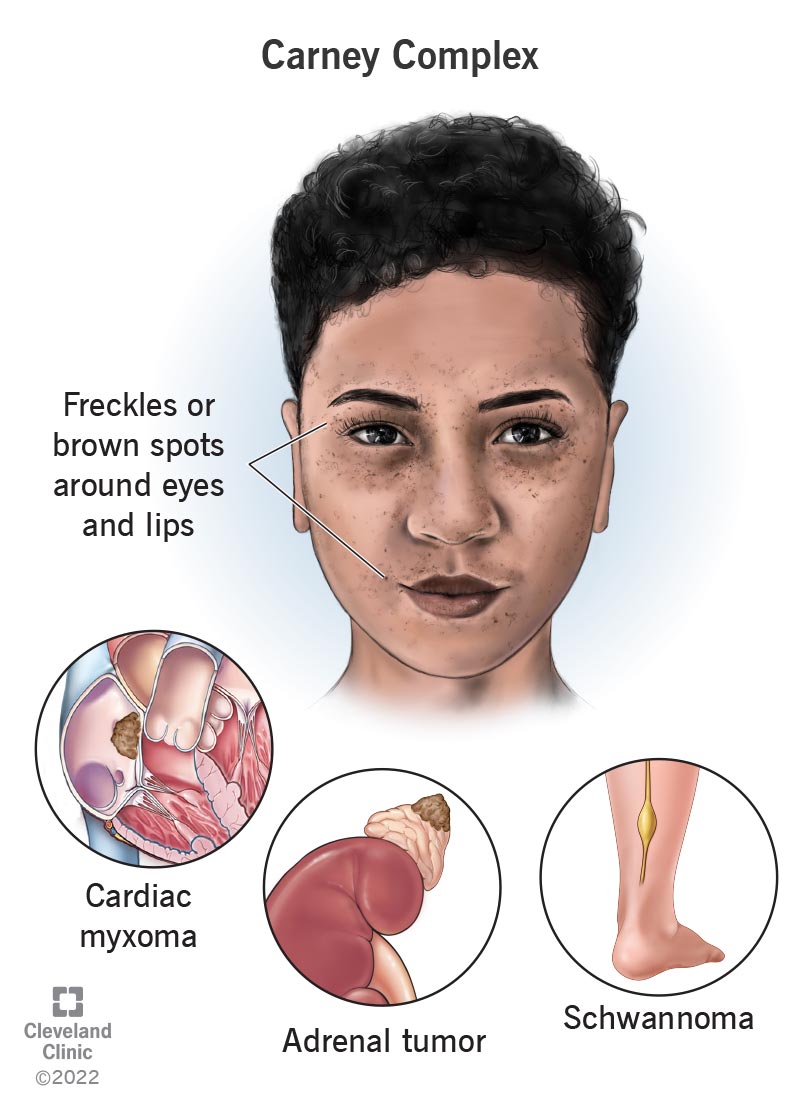Carney complex, also known as Carney syndrome, is a rare genetic condition that causes skin pigmentation changes and benign tumors to form in children and young adults. Tumors can cause hormonal changes that affect some body functions. In these cases, healthcare providers may remove these tumors with surgery.
Advertisement
Cleveland Clinic is a non-profit academic medical center. Advertising on our site helps support our mission. We do not endorse non-Cleveland Clinic products or services. Policy

Image content: This image is available to view online.
View image online (https://my.clevelandclinic.org/-/scassets/images/org/health/articles/24148-carney-complex)
Carney complex is a condition that creates changes in your skin’s color. It also causes noncancerous (benign) tumors to form in your body’s connective tissues and endocrine glands. A change (mutation) in a gene that parents pass to their children usually causes this condition.
Advertisement
Cleveland Clinic is a non-profit academic medical center. Advertising on our site helps support our mission. We do not endorse non-Cleveland Clinic products or services. Policy
Yes, Carney complex is also called:
Carney complex is present at birth in people with a certain genetic mutation. But healthcare providers don’t diagnose most people with this condition until symptoms appear. Symptoms can appear at any time throughout childhood, but providers diagnose most people around age 20.
Carney complex is not common. Experts know of less than 750 people who have this condition.
Carney complex is a genetic disorder. The condition happens when there is a mutation in the PRKAR1A gene. DNA in this gene tells your body how to make an enzyme that controls how a certain protein behaves. When the PRKAR1A gene mutates, this enzyme can’t control the protein and cells begin to grow in ways they shouldn’t.
In about 70% of cases, Carney complex happens when one parent passes this genetic change to their child. But some people with this condition have a new genetic mutation that they didn’t get from a parent.
Some people with Carney complex don’t have a genetic mutation. Researchers think changes to part of a certain chromosome (molecules made of genes) can also cause Carney complex, but they’re still learning more about this.
Advertisement
If you have Carney syndrome, you may notice changes in the color (pigmentation) of your skin. You may have many freckles or brown spots (lentigines). These spots can form anywhere but are common near the:
You might also develop moles that are blue or black (blue nevi).
Some people with Carney complex form tumors in their heart (cardiac myxoma). Tumors can also form in the:
Often, these tumors are benign. But some tumors can become cancer (malignant).
No, Carney complex is not contagious.
If you or your healthcare providers notice symptoms of Carney complex, your provider will do a physical examination. They will also ask about any family history of the condition. You may need genetic testing to confirm the diagnosis.
Depending on which symptoms you or your child have, healthcare providers may recommend:
Your healthcare provider will recommend treatments for you or your child based on specific symptoms. They may recommend:
Your provider will talk with you about the best treatment options.
Carney complex is a lifelong condition. Your healthcare provider can recommend treatments to manage symptoms and help you or your child stay healthy.
If you have Carney complex, be sure to let your healthcare provider know about any new symptoms. Your provider may recommend regular tests to check your hormone levels and your health. You may have:
Carney complex is a lifelong condition. Your healthcare provider is an important partner in managing your symptoms and helping you stay healthy.
People with Carney complex may have a normal life expectancy. But it’s important to see your healthcare provider for regular screenings and follow-up visits.
Yes, it's common for tumors to return.
Most tumors that develop in people with Carney complex are benign. But some tumors can become cancerous over time. Talk to your healthcare provider about new symptoms, and be sure to keep all follow-up appointments to check for tumor changes.
There’s no way to prevent Carney complex. If you're pregnant, genetic amniocentesis can help you know whether your baby might have certain genetic mutations.
Advertisement
If someone in your family — especially a parent — has Carney complex, discuss this with your healthcare provider.
Tumors that form in your pituitary gland (part of the endocrine system) can affect how your body makes hormones that control how you grow. If your body produces too much growth hormone, you might have:
Tumors in other endocrine system glands can lead to:
Follow your healthcare provider’s instructions and keep all testing and follow-up appointments. Let your healthcare provider know if you have any new symptoms.
Tumors that form in your heart can interfere with blood flow. These blockages can lead to stroke, heart failure or sudden cardiac arrest. Let your healthcare provider know right away if you have:
Carney complex is a rare genetic condition that causes skin pigmentation changes and benign tumors throughout your body during childhood and young adulthood. If these tumors cause problems with your heart or endocrine system, your provider may remove them during surgery. Follow your healthcare provider’s instructions and keep all follow-up appointments to help you or your child stay healthy.
Advertisement

Sign up for our Health Essentials emails for expert guidance on nutrition, fitness, sleep, skin care and more.
Learn more about the Health Library and our editorial process.
Cleveland Clinic’s health articles are based on evidence-backed information and review by medical professionals to ensure accuracy, reliability and up-to-date clinical standards.
Cleveland Clinic’s health articles are based on evidence-backed information and review by medical professionals to ensure accuracy, reliability and up-to-date clinical standards.
Do certain health conditions seem to run in your family? Are you ready to find out if you’re at risk? Cleveland Clinic’s genetics team can help.
